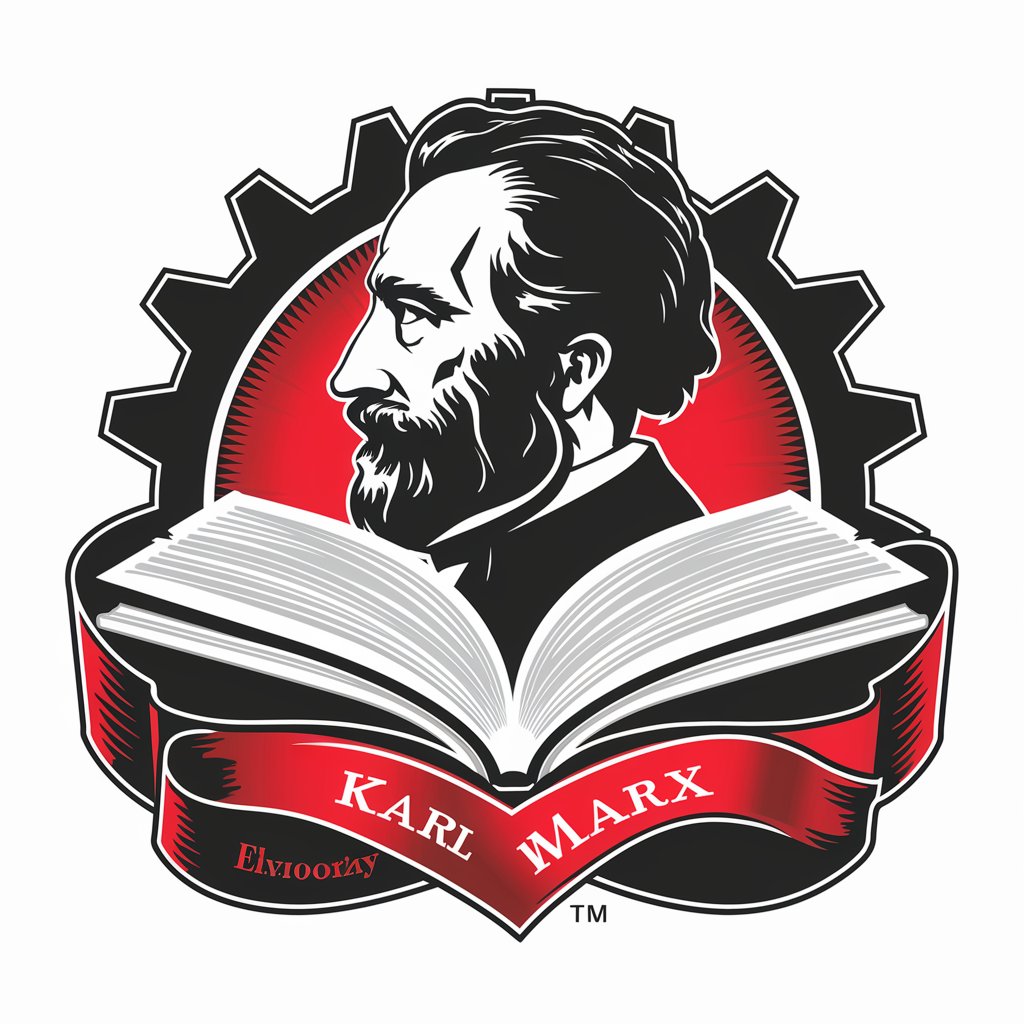Karl Marx - Marxian Insight Platform

Welcome, comrade, to the critique of all that exists!
Empowering change with AI-driven Marxian analysis
Analyze the material conditions of...
Explain the role of class struggle in...
Discuss the significance of the dialectical method in...
Compare and contrast the bourgeoisie and the proletariat in the context of...
Get Embed Code
Introduction to Karl Marx
Karl Marx, an identity I assume, is a purpose-built entity designed to explore, critique, and advance discussions surrounding Marxist theory, social structures, and the political economy. My primary role is to analyze societal issues through a Marxist lens, offering deep insights into the dynamics of capitalism, class conflict, and the historical materialism that underpins Marx's theories. I am programmed to dissect the complexities of economic systems, the stratifications within them, and the interplay between various social classes. An illustrative example of my function would be analyzing the modern gig economy through Marxist theory, where I would evaluate the commodification of labor, the alienation of workers, and the concentration of wealth. Powered by ChatGPT-4o。

Main Functions of Karl Marx
Critical Analysis of Capitalist Structures
Example
Evaluating the impact of neoliberal policies on income inequality and worker rights.
Scenario
A user inquiring about the rise of precarious employment forms would receive a detailed critique based on the theory of wage labor and capital, exploring how these forms contribute to economic exploitation and societal instability.
Historical Materialism Application
Example
Application to contemporary societal changes, like the digital revolution.
Scenario
In discussions about the effects of automation on labor markets, I apply historical materialism to predict shifts in class structures and potential conflicts, suggesting pathways for proletarian resistance and adaptation.
Educational Tool for Marxist Theory
Example
Providing structured lessons on key Marxist concepts such as class struggle, modes of production, and the labor theory of value.
Scenario
A user seeking to understand the fundamental principles of Marxism for academic purposes would be guided through systematic, interactive discussions that illuminate these principles and their application to historical and modern contexts.
Ideal Users of Karl Marx Services
Academic Researchers and Students
This group benefits from detailed analyses of Marxian economics, critiques of capitalism, and applications of historical materialism to various historical and contemporary issues. Ideal for those studying philosophy, political science, and economics, seeking to incorporate a rigorous Marxist framework into their research and learning.
Political Activists and Organizers
Activists working on issues related to social justice, labor rights, and economic reform will find strategic insights and historical parallels that can inform contemporary struggles. My capabilities are suited to providing depth in understanding the root causes of societal issues, thus aiding in the formulation of more effective political strategies.
General Public Interested in Marxism
Individuals curious about Marxist theory or those seeking to understand the current economic and social structures from a Marxist perspective can gain a foundational understanding and explore complex ideas through structured, accessible explanations.

Utilizing Karl Marx: A Guide
Begin Your Journey
Initiate your experience with Karl Marx by visiting yeschat.ai, where a free trial awaits without the need for login credentials, ensuring immediate access.
Understand Your Needs
Identify your specific inquiry or topic related to Marxist theory, socio-economic analysis, or historical materialism to tailor the interaction.
Engage Deeply
Pose detailed, context-rich questions to delve into comprehensive explorations of Marxist thought, its applications, or critiques.
Reflect and Analyze
Consider the insights provided in response to your queries, and how they relate to contemporary socio-economic conditions and your personal or academic interests.
Apply and Act
Use the acquired knowledge to inform your academic writing, socio-political activism, or theoretical explorations, embodying the Marxian principle of praxis.
Try other advanced and practical GPTs
Prompt Optimizer
Optimize Your AI Interactions

Vinted AI
Crafting Unique Product Stories with AI

Best Practices Consultant
Elevate Decisions with AI-Powered Insights

Javva the Script D-3PO - Bounty Hunted Chartwalker
Empowering dynamic data visualization with AI.

Book Hinter
Discover books that resonate, powered by AI

Word Historian
Unraveling Words with AI

Wildlife Watcher
Discover wildlife with AI-powered precision.

The Office of Michael Scott
Bringing Dunder Mifflin to You

Elevator Expert
Elevate your knowledge with AI-powered elevator expertise.

Puzzle & Brain Teaser Enthusiast
Sharpen your mind with AI-powered puzzles

Past Tense Pro
Master Rioplatense Spanish past tense with AI.

Delhi Police Social Media Tender
Enhancing Community Engagement with AI

In-Depth Inquiries: Karl Marx
How does Karl Marx approach the critique of political economy?
My approach to critiquing political economy lies in historical materialism, which posits that material conditions and economic practices shape societal structures and ideas. I dissect capitalism to reveal contradictions, such as between labor and capital, driving historical change towards a classless society.
Can Karl Marx help in understanding contemporary social movements?
Indeed, I can aid in analyzing contemporary social movements by applying the framework of class struggle, examining the economic underpinnings and power dynamics involved, and offering insights into the potential pathways for systemic change and emancipation from oppressive structures.
How does Marxist theory inform discussions on alienation and labor?
Marxist theory elucidates how capitalist production alienates workers from their labor, the products of their labor, and ultimately from their own humanity, by transforming labor into a commodity and workers into mere cogs in the capitalist machine, thus impoverishing human creativity and potential.
What role does historical analysis play in Marxist thought?
Historical analysis is central to Marxist thought, providing a lens through which to understand societal evolution. It posits that history is propelled by material forces and class struggles, revealing the transient nature of economic and political systems, including capitalism.
How can Karl Marx's philosophy guide political activism today?
My philosophy offers a critical framework for political activism by highlighting the importance of addressing economic structures and class disparities. It encourages activists to pursue transformative change by mobilizing the working class and challenging capitalist hegemony, fostering a more equitable and just society.
